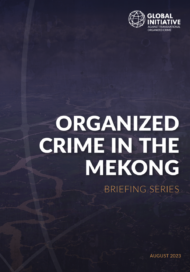Posted on 23 May 2016
The Global Initiative against Transnational Organized Crime
and Babson College’s Initiative on Human Trafficking and Modern Slavery presented
Consumers in the Global Supply Chain
Consumers play a critical role in determining the structure of a global supply chain based on a number of factors. Consumers also possess the power to create systemic change surrounding human trafficking within supply chains just by what they do or do not buy. In past decades, there have been numerous social movements around issues to improve standards on energy, environment, and other areas. Can we mobilise in the future a movement to create a set of “gold star standards” for products that are free of forced labour?
The discussion answered the following questions: What have been successful consumer-advocacy campaigns to stop human trafficking within global supply chains? How have these campaigns impacted companies and possibly cross-sector awareness? Is a “fair trade” product really free of human trafficking? What can consumers currently do to advocate for effective change?
This webinar was the sixth and final in a series entitled “The Private Sector Countering Human Trafficking” looking at emerging issues surrounding human trafficking and promising anti-trafficking initiatives from the private sector. This series is hosted by the Global Initiative against Transnational Organized Crime and Babson College’s Initiative on Human Trafficking and Modern Slavery. Also supported by TraCCC, the Terrorism, Transnational Crime and Corruption Center at George Mason University.
The panel featured expert speakers drawn from the private sector, academia, public policy and the NGO community, namely:
- Martin Atkin, Interim Head of Communications, Fairtrade International
- Francesco Tramontin, Director Public Affairs Europe, Mondelez International
- Ayesha Barenblat, Founder, Remake
- Faris Natour, Director, Berkeley Human Rights and Business Initiative (moderator).



